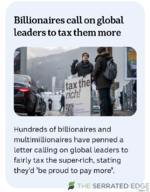View attachment 56266
Reflecting on the ABC article and the discussion abroad, it strikes me that this is a narrative as old as time: the existence of wealthy elites and the societal push to hold them accountable—whether through taxes, reforms, or revolutions. The key difference today seems to be that some billionaires are actively calling for higher taxes on themselves, which diverges from the typical storyline of resistance from the ultra-wealthy. It’s an unusual twist in the broader debate over wealth inequality.
That said, the argument often feels muddled. Are we suggesting that the system is broken because billionaires exist at all? Or are we arguing that it’s broken because they aren’t contributing enough to the public good? History has shown us that these debates are cyclical, but the real question is whether these discussions will lead to tangible change for everyday people. Without a clear connection between taxing the rich and improving the lived realities of the majority, it’s hard to generate widespread urgency or concern over this issue.
As for the supposed tyranny of the super-rich, the claims often lean heavily into speculation. Certainly, figures like Elon Musk and other billionaires wield extraordinary power and influence, but where is the concrete evidence of coordinated efforts to establish a dystopian system of control? While it’s true that big business and politics have long been intertwined, the system itself hasn’t devolved into outright tyranny. In fact, collaboration between governments and corporations seems far more viable as a business model. The mutual dependence of public and private sectors on stability and consumer trust makes systemic domination or subjugation economically counterproductive—even for the ultra-wealthy. Anything else would seem not only implausible but also fundamentally self-defeating.
Moreover, there are real, tangible global challenges that deserve our attention—climate change, resource scarcity, and economic inequality among them. These issues do not discriminate based on wealth; they threaten everyone. Whether Elon Musk or Jeff Bezos has an extra zero in their net worth becomes irrelevant in the face of planetary crises that require collective action. From this perspective, the focus on "trillionaire tyranny" feels like a distraction from these pressing concerns.
This is not to suggest that billionaires shouldn’t contribute more. If taxing the wealthy into paying their fair share can address systemic inequities or fund public goods, it’s a worthwhile pursuit. However, the narrative of a dystopian billionaire-led cabal feels unsubstantiated and impractical. For the wealthy to establish dominance by dismantling the very systems that created and sustain their fortunes would be an act of self-destruction. Collaboration—not domination—is the far more likely path forward, as it aligns with economic logic and stability.
Ultimately, while debates about wealth inequality are important, they must be paired with clear, actionable solutions that address the challenges we all face. Speculative fears about tyranny won’t solve climate change, housing crises, or resource shortages. What we need are policies and practices that foster collaboration and equity, not narratives of fear and division.










